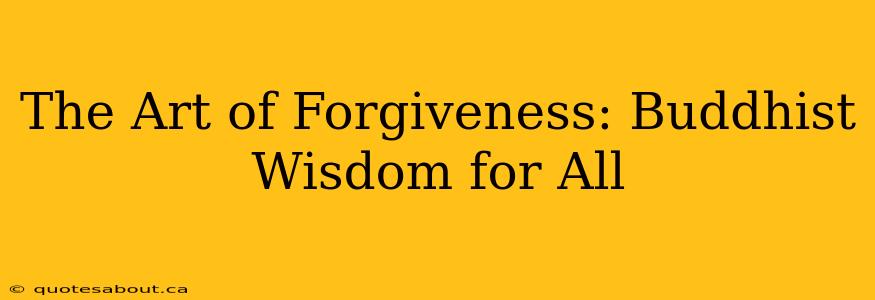Forgiveness. The word itself evokes a range of emotions – relief, peace, anger, even resentment. It's a concept deeply explored across many spiritual traditions, but perhaps nowhere more profoundly than in Buddhism. This isn't about condoning harmful actions, but rather about liberating yourself from the chains of anger, bitterness, and pain that holding onto resentment creates. This article delves into the Buddhist perspective on forgiveness, exploring its practical application and profound benefits in our daily lives.
What is Forgiveness in Buddhism?
In Buddhism, forgiveness, or ksama, isn't simply overlooking a wrongdoing. It's a conscious, active process of releasing negative emotions associated with harm, both inflicted and received. It's recognizing the interconnectedness of all beings and understanding that everyone acts from a place of suffering, ignorance, or delusion. This understanding fosters compassion and empathy, making forgiveness possible. It's not about forgetting the event, but rather transforming your relationship with the pain it caused.
Why is Forgiveness Important in Buddhism?
The importance of forgiveness in Buddhist teachings stems from the concept of dukkha, or suffering. Holding onto anger, resentment, and hatred only perpetuates this suffering, impacting both your mental and physical well-being. Forgiveness, on the other hand, breaks this cycle. By releasing these negative emotions, you create space for peace, inner harmony, and greater compassion, not just for others, but also for yourself.
How Can I Practice Forgiveness?
The path to forgiveness is rarely linear. It's a journey of self-discovery and emotional growth. Here are some key practices inspired by Buddhist teachings:
1. Cultivating Mindfulness:
Mindfulness allows you to observe your emotions without judgment. When feelings of anger or resentment arise, acknowledge them without getting swept away. Simply observe them as passing sensations, like clouds drifting across the sky.
2. Understanding the Roots of Suffering:
Buddhist philosophy emphasizes the interconnectedness of all beings and the role of ignorance and suffering in shaping our actions. Try to understand the perspective of the person who harmed you. Their actions might stem from their own pain and ignorance. This perspective shift can pave the way for compassion and forgiveness.
3. Practicing Loving-Kindness (Metta):
Metta meditation involves cultivating feelings of loving-kindness towards oneself and others, including those who have caused you harm. This practice gradually softens the heart and makes forgiveness more accessible.
4. Engaging in Compassionate Action:
Sometimes, acting compassionately towards the person who harmed you can be a powerful step towards forgiveness. This doesn't mean condoning their actions, but rather extending kindness and understanding.
What if I Can't Forgive?
Forgiveness is not a quick fix or an obligation. It's a process that takes time and effort. If you find it difficult to forgive, be patient with yourself. Recognize that it's okay to feel anger and resentment. Focus on self-compassion and continue practicing mindfulness and meditation. Professional guidance from a therapist or spiritual counselor can also be beneficial.
Is Forgiveness the Same as Reconciliation?
No, forgiveness and reconciliation are distinct. Forgiveness is an internal process; it's about releasing your own negative emotions. Reconciliation, on the other hand, involves re-establishing a relationship with the person who harmed you. You can forgive someone without reconciling with them, and vice versa.
Can Forgiveness Heal Trauma?
While forgiveness isn't a cure-all for trauma, it can be a crucial component of the healing process. By releasing the grip of negative emotions, you can create space for emotional processing and healing. However, it's important to acknowledge that healing from trauma often requires professional support, such as therapy.
How Does Forgiveness Benefit Me?
The benefits of forgiveness extend far beyond emotional well-being. Studies have shown a correlation between forgiveness and improved physical health, reduced stress levels, and enhanced mental clarity. It fosters healthier relationships, allowing you to move forward with greater peace and joy.
By embracing the Buddhist wisdom of ksama, you embark on a journey of self-liberation. It’s a path that requires patience, compassion, and self-awareness, but the rewards – inner peace, emotional freedom, and a more compassionate heart – are immeasurable. The journey towards forgiveness is a testament to the human spirit’s capacity for growth and healing.

